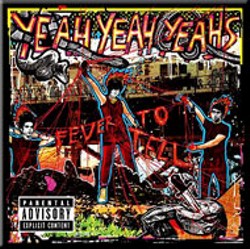Champion in the Arena: 1976-1977
Blood and Fire
The concept was simple but exquisite. Take one of Jamaican music's most prominent session musicians, keyboardist Jackie Mittoo -- a founding member of the Skatalites, a fixture at Studio One -- and let his swirling organ wash over a set of deeply organic reggae grooves. Produced by Bunny Lee (who spices in dub effects sparingly), these mid-70s songs feature such stalwart players as Sly and Robbie, Chinna Smith and others. The sound is raw but clean, and Mittoo, while no Jimmy Smith, proves to be a vibrant soloist. --Eric Snider
Pilot to Gunner
Games At The High Speeds
Arena Rock Recording Co.
This Brooklyn-based quartet's first full-length for rising indie Arena Rock has a lot in common with their live sets: It's good, energetic and visceral, but before long the sameness sends your attention wandering -- to be recaptured only sporadically by sudden bursts of greatness. The disc comes on strong with two standout tunes: "Every Minute is a Movie" and the title track immediately references D.C. post-core pioneers Jawbox. They achieve this by relying on immaculate rhythms, melodic bass lines and discordant two-guitar interplay for impact, rather than familiar vocal or power-chord hooks. Vocalist Scott Padden further begs the comparison with a limited range that rides the ragged edge of melody and forcibly recalls Jawbox vocalist J. Robbins. None of which is bad, and serves to add a depth and substance to Pilot to Gunner's mania that's missing from many of the bands with whom they'll undoubtedly be lumped. Too many of the remaining songs, however, groove by indistinguishably in a snarled mass of dissonant guitar lines. "Zero Return" once again perfectly balances things to compelling effect, as do "It's So Good to be Here in Paris," the album's comparatively lengthy centerpiece, and the intriguing "The Lurid Loop's Dead." But about half of Games at High Speeds is content to wander around Pilot to Gunner's style rather than an attempt to map it -- and those songs just don't add the meat to the sinew like the record's best tracks do. --Scott Harrell
Pat Metheny
One Quiet Night
Warner Bros.
This is the kind of thing you can do when you're a seasoned, commercially successful jazzer like Pat Metheny: On the night of Nov. 24, 2001, he adjourned to his home studio in New York with a custom-made baritone guitar and a low, Nashville tuning. He rolled tape and played. He listened to it on the road and fleshed it out with a few more tunes. Now here it is, out on Warner Bros. as One Quiet Night. It's Metheny's first solo acoustic guitar record (sans overdubs, by the way) and makes a nice addition to his far-flung discography, much of which is orchestral and heavily produced.
The title says it all: these songs are sedate and exploratory, all but devoid of flash or chopsmanship. This is a subtle album, but some of the changes are quite striking. Alongside roaming Metheny originals sit a few of the guitarist's favorite songs: a sweet, languid version of Norah Jones' Grammy-winning "Don't Know Why;" a lovely turn at the old Gerry & the Pacemakers tune "Ferry Cross the Mersey;" and an undulating take on Keith Jarrett's "My Song." Of the new material, the relatively spunky "Song for the Boys" features a sequence of lovingly strummed chords that captures that open-air feeling of his work with Pat Metheny Group. One Quiet Night is not a blow-you-away disc, but it will provide some of the "peace and enjoyment" that Metheny mentions in the liner notes. --Eric Snider
Yeah Yeah Yeahs
Fever To Tell
Interscope
By and large, Fever to Tell is a solid and intriguing effort but, ironically, the Yeah Yeah Yeahs' biggest perceived asset reveals itself as a sonic liability: on record, Karen O's lead vocals can be irritating as all get-out. Throughout the first half of the record, O detracts hugely from Brian Chase's spot-on rhythms and guitarist Nick Zinner's brilliant amalgam of tradition and innovation. There's no doubt O's got pipes and attitude to spare, but she spends the first four tracks of the disc tripping over herself (and the tunes) in an effort to drive it home. By the excellent "Pin," the album arrives at an uneasy balance between listener acclimation, O's style, and hooks that will not be upstaged. This gestalt holds for the rest of Fever to Tell, revealing the top-notch craft inherent in "No No No" -- at least until it devolves into a self-indulgent space-dub -- "Maps," and particularly "Y Control." These songs display an intuitiveness and sense of restraint on O's part lacking from other material. Musically speaking, Fever to Tell leaves the majority of its ilk behind. Zinner and Chase are a formidably talented instrumental team, and O certainly possesses both the image and the chops. But the ratio of the former to the latter needs a bit of readjustment if she is to lead the Yeah Yeah Yeahs beyond the realm of great expectations to true greatness. --Scott Harrell
Alkaline Trio
Good Mourning
Vagrant
Hmmmm. Very strange. The airtight, darkly shadowed pop-riff hooks are in full effect. As is the marvelously sharp and self-deprecating wordplay. Ditto the infectious, Smoking Popes-inspired vocals and their corresponding ear-candy melodies. So why does the Chicago-bred threesome's latest batch of misanthropunk come off as a bit of a disappointment?
Maybe it's Good Mourning's tendency toward upper mid-tempo cohesion -- previous Trio releases careened between blitzkrieg bpms and hung-over dirges with an enthralling sense of gleefully suicidal carelessness. Maybe it's the guitar sound, as Matt Skiba's former whatever-amp-works gnashing has been replaced by multiple layers of softer, earthier, more expensive tones. Or maybe it's the relative lack of inventive time-signature skewering; only bassist Dan Andriano's admittedly excellent "If We Never Go Inside" does it, and then only minimally. Obviously, all of these factors play a part. But what's really lacking from Good Mourning is the sense of tossed-off greatness that permeated From Here to Infirmary and Maybe I'll Catch Fire. This disc is better than just good. "This Could Be Love," "Continental," "Fatally Yours," the compelling acoustic closer "Blue in The Face" and one or two others stand with the band's best material. Taken as a whole and compared to their catalog, however, it sounds curiously self- conscious, like a little too much studio time and a little too little blind charge went into its creation. --Scott Harrell
Speaking of Vibes_feature2.html
-
Hillbilly Pleasures
Jul 20, 2005 -

Plug & Pray
Jul 13, 2005 -
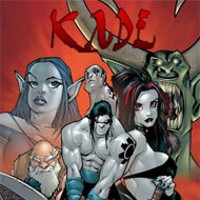
Indie rules
Jul 6, 2005 - More »
Latest in Music Features
More by Scott Harrell
-
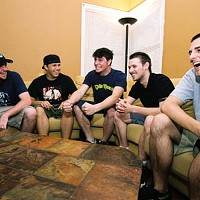
Anatomy of a Scene
Apr 12, 2006 -

Blowfly for president
Jan 18, 2006 -

Have Yourself a Scary Little miX-Mas
Dec 8, 2004 - More »
More by Eric Snider
-
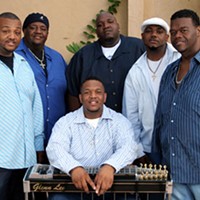
Men of Steel
Jul 19, 2006 -

She Can Stand the Strain
Apr 12, 2006 -
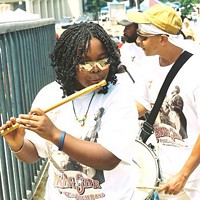
Rising Star
Apr 12, 2006 - More »
Calendar
-
BLP Kosher Presents: The Dreidelman Saga Tour @ The Underground
-
First To Eleven w/ Daytona Beach 2000 @ Amos' Southend
-
SAINT MOTEL - The Awards Show @ N.C. Music Factory
-
Wage War & Nothing More @ N.C. Music Factory
-
Taylor Acorn @ Amos' Southend
-
Angela Saylor Brings Her Electronic Music Project 'Minthill' Back Home
The Art of Memory
-
Twisted Chick: Nico Vega in concert (12-06-2009)
Adrenalin junkies fall in line and check out Nico Vega to get your fix.
-
Sights from the 2011 Vans Warped Tour
Annual day-long music festival brings variety of genres to Verizon Wireless Amphitheatre on July 28, 2011.

